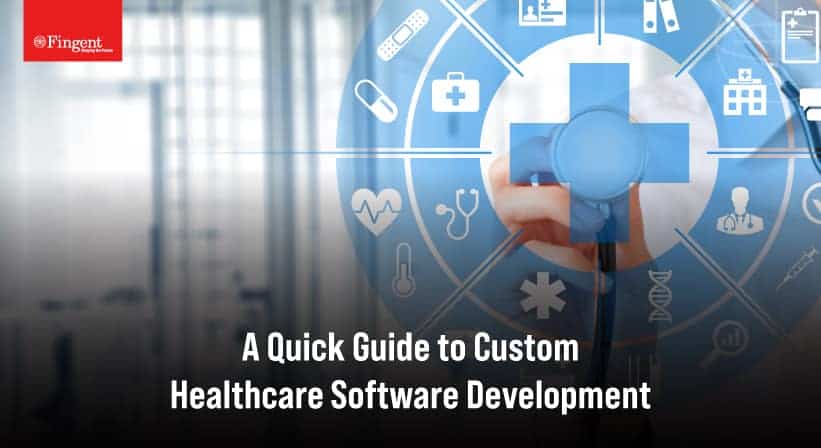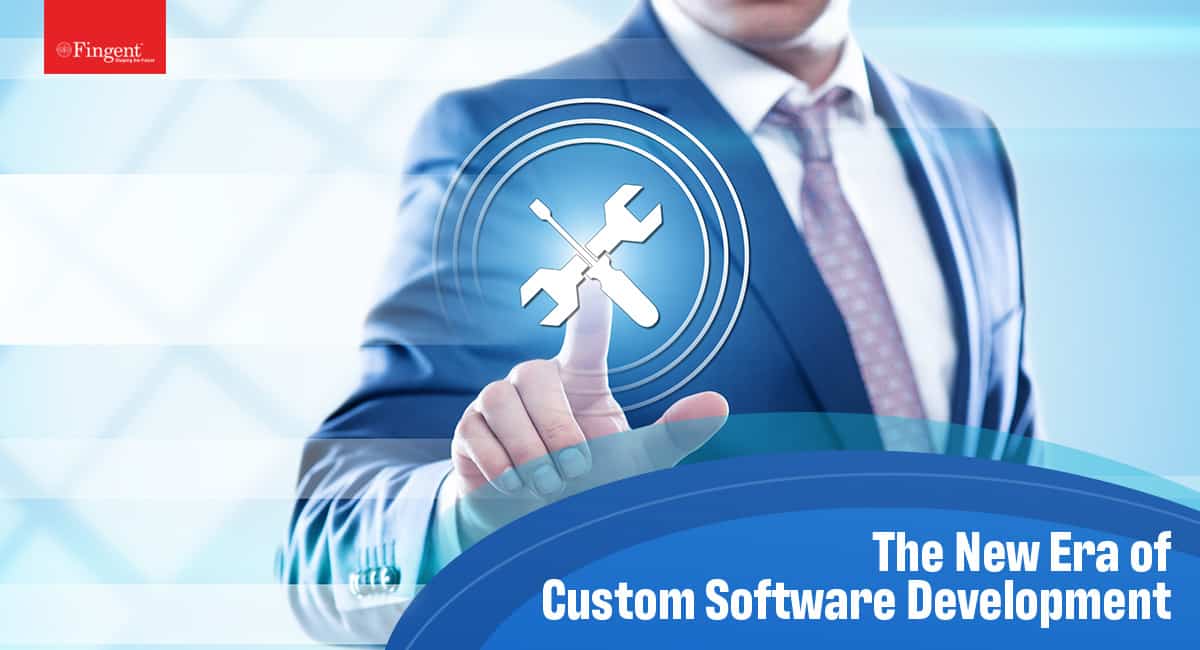Off-the-shelf vs. Custom Software : Making the Right Choice for Your Business
The perennial build versus buy question continues to haunt enterprises in search of software solutions. Off-the-shelf software is ready-to-use once they are installed on a computer or device. Custom software, on the other hand, is developed according to specific requirements and specifications.
There is a huge gap between these two technologies in terms of performance, functionalities, and usability. Each option has its own merits and demerits, and here is a rundown of the same.
-
The Question of Cost
An off-the-shelf product will typically be moderately priced when compared to a custom developed product; the obvious reason being that the cost involved in developing an off-the-shelf product is distributed among a large number of buyers, and thus pricing is spread across several licenses to be sold. A tailored product, on the other hand, is specifically developed for a client, and as a result, all the development expenses will be borne by that individual client. Hence, considering the costs, it might seem that an off-the-shelf product is a right way to go.
Purchasing software off-the-shelf also offers an accurate estimate of the cost and valuable support for everything that lies ahead throughout the lifecycle of the project. But, in terms of performance, they might not be as apt as custom-made products.
Many enterprises underestimate the time and resources required to develop custom software in-house. The development team needs to take into account, not just the initial design, build, test, and implementation costs, but also the lifetime cost required for support, headcount enhancements, patches, and general maintenance. There is also the issue of costs for the inevitable functionality enhancements and upgrades in future to consider.
Even when the enterprise has the adequate budget for in-house custom software development, they still have to consider the availability of a skilled team in-house, or access to such a team through outsourcing. The outsourcing route in a way offers the best of both worlds, or the availability of ready resources to develop software the way the enterprise wants it.
-
Which is easier to implement?
Coding is getting easier by the day. Gone are the days when programmers spend weeks on end ruminating lines of code even in their sleep. Today, coding is taught at the high school level, and the proliferation of open source means code snippets are readily available for just about any functionality. What’s more, intuitive drag-and-drop interfaces make it possible to roll out highly advanced applications without even writing a single line of code. Many such platforms, such as QuickBase, Zoho Creator, Salesforce Platform, FileMaker, make the task of developing highly intuitive apps and software solutions easy. A basic level of code knowledge would suffice to make the required customizations, quickly.
However, the ease of coding doesn’t mean app development is a piece of cake. Coding is just one aspect of the overall app development process. Requirements gathering, app design, UX, testing and other critical aspects of the software are all challenging tasks which require highly skilled and experienced professionals.
While, theoretically, developing a custom software may seem like an attractive and manageable proposition despite the high level of skills required, on the ground, enterprises could find such developmental tasks to be a distraction from their core focus. The internal IT resources may already be engaged in routine maintenance activities, and development works could pose a drag on their efficiency. With custom software, the enterprise will have to bear the brunt of all the drawbacks until the glitches are ironed out, and the software finally matures. With off-the-shelf software, the enterprise can learn from the mistakes of others.
Moreover, the core focus of the developers of off-the-shelf software is the software itself, and they incorporate agile and other best practices. They also keep abreast with changing technology to remain ahead of the game. Therefore, before it’s released to market, the software will be tried and tested extensively, and glitches ironed out.
However, purchasing software ‘off-the-shelf’ is also not as easy as picking apples off a supermarket shelf. The procurement process is elaborate, with the source-to-contract process raising specific challenges. The in-house team would still have to perform the requirement gathering exercise, to find a suitable product. Such ‘off-the-shelf’ programmes also have to be evaluated for UX, ease-of-use, supporting infrastructure required, and other parameters, all requiring considerable effort from the enterprise.
-
The Need for Deep Customization
As a rule of thumb, developing the software in-house is a good idea if the software requires extensive customization. Enterprises which seek to develop basic and generic software to support common routine functionality, such as solutions for emails, discussion forums and file sharing are ‘reinventing the wheel’. It is foolhardy to develop software in-house when industry majors such as Google, Microsoft, and others offer advanced, scalable and secure solutions, customizable with the enterprise name. Likewise, those seeking a CRM suite would do well to pick up any of the ready-made CRM suites available in the market, such as a Salesforce CRM, HubSpot CRM, Insightly, or Zoho CRM. Most of such suites are highly matured products offering a high level of functionality and the option to pick-and-choose the required modules.
However, the devil lies in the details. When the off-the-shelf software is not matured or modular enough, it may clog systems with unneeded options even when fitting organizational needs well. In such situations, creating a custom software can eliminate the excess and ensure bloat-free software, optimized to the exact needs of the business.
-
The Challenge of Integration
In an age where data analytics is a valuable source of competitive advantage, enterprises need to ensure seamless integration of the software with other enterprise systems, especially the back office and finance systems. Marketers and other customer-facing representatives require complete access to real-time interactions, without being hindered by data silos, for which seamless integration is imperative.
The extra time and investment in developing custom software may well be worth its while, considering the benefits of seamless integration.The developer would consider the existing system when preparing the blueprint for the software development project, and make sure the new software functions smoothly within the existing IT ecosystem.
-
Upgrades
Off-the-shelf products have regular updates, which might not be all that heavy on the pocket. Also, if you go for a quality product, you might also enjoy flawless customer support. But sometimes, they might not get updated for a long period of time, due to which you might end up working with an outdated product causing a negative impact on your business.
With custom software solutions, you have the freedom to make whatever changes you want, whenever you want. You are always independent regarding the decisions you take for the software. You don’t have to wait for new releases and introductions, to add features to your software. Whether it is an upgrade or changes you need to make to include new tasks and operations, you can get them done by custom software experts at any time.
-
Nature of the Enterprise
The technical factors and benefits notwithstanding, the nature of the enterprise can also have a big say on whether to opt for developing custom software or purchasing software off-the-shelf.
Smaller companies rarely have the budget, time, or resources to create custom software. Their requirements are unlikely to require complex integrations either. As such, an off-the-shelf solution would probably fit their needs. However, at the same time, the extra effort and investment in developing custom software may be worth its while, if the business has to expand its footprints. Developing a custom platform can create a more streamlined process for a business. Custom software is easily scalable and replicable. Off-the-shelf software is unlikely to provide such scalability without duplicating the investment.
Another important dimension to consider is the end-user or the people who use the software. The off-the-shelf software comes with a complete ready-to-use package, tested for all bugs and has gone through extensive usability tests. Whereas, the custom software requires extensive investment in training users. The process may also involve some trial-and-error, with each version improving on previous versions. The implications on business operations during such a trial-and-error phase can be debilitating.
Custom-made products are generally quite flexible and of course best suited for companies with specific requirements. Some other benefits of custom software solutions are:
-
Scalability
Scalability is one of the most important factors to consider while choosing technology for your business. Your software should be scalable enough to accommodate the present requirements of your business and also make room for future additions. As your business grows, you might have to add features and maybe even departments to the software you use. Hence, it is always better to get your software built in a scalable way. Off-the-shelf solutions do not have this facility.

-
Competitive advantage
You get to use a software made exclusively for your business with all kinds of unique features and specifications that other businesses don’t have. Hence, you gain a competitive advantage over your competitors, with your unique solution.
If you are building a solution just for your business over its specific requirements, a custom software would be perfect and hence satisfaction would be guaranteed. As experts once said, you need to adopt software and align it with your business process and not the other way round. You don’t just adopt a rigid software and try aligning your processes around it.
To cut the story short, there is no conclusive winner in the build versus buy dilemma. The best option depends on the circumstances. However, making the wrong decision can be costly. For this reason, it is imperative enterprises carefully evaluate the pros and cons of both options, and rationalize based on the specific circumstances surrounding their enterprise. When making the trade-off, the primary concern should be the on the efficiency with which the software allows them to serve their customers and other stakeholders in the most effective manner.
Stay up to date on what's new

Recommended Posts

17 Jan 2025 B2B
Custom Software Development Services: Unlocking Business Potential for Greater Success
Is your software helping you grow—or holding you back? Off-the-shelf solutions may seem convenient. But they often fail to meet your business's unique needs. This is where custom software development……

22 Jun 2023 Healthcare B2B
Custom Healthcare Software Development – Ultimate Guide!
The world of technology keeps evolving and waits for no one, so it is our responsibility to keep up with it rather than fall behind. The healthcare industry has for……

01 Jun 2021 Retail
Custom Retail Software Solutions: Everything You Need to Know!
How Retail Software Solutions Help You Gain A Competitive Advantage The retail industry has witnessed a tremendous transformation over the past few years. Innovative retail technologies have made the sector……

28 Jan 2021
Custom Software Solutions: Ideal Way to Build Business Apps
Is custom software poised to fulfill business needs in 2021? From small firms to established companies, the COVID-19 pandemic has forced businesses and leaders to embrace digital transformation. Businesses are……
Featured Blogs
Stay up to date on
what's new















